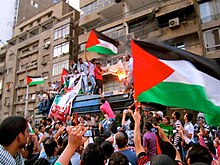
Benjamin "Bibi" Netanyahu is an Israeli politician who has been serving as the prime minister of Israel since 2022, having previously held the office from 1996 to 1999 and again from 2009 to 2021. He is the chairman of the Likud party. Netanyahu is the longest-serving prime minister in the country's history, having served for a total of over 16 years. He is also the first prime minister to have been born in Israel after its establishment.

The Egypt–Israel peace treaty was signed in Washington, D.C., United States, on 26 March 1979, following the 1978 Camp David Accords. The Egypt–Israel treaty was signed by Anwar Sadat, President of Egypt, and Menachem Begin, Prime Minister of Israel, and witnessed by Jimmy Carter, President of the United States.

Intermittent discussions are held by various parties and proposals put forward in an attempt to resolve the ongoing Israeli–Palestinian conflict through a peace process. Since the 1970s, there has been a parallel effort made to find terms upon which peace can be agreed to in both the Arab–Israeli conflict and in the Palestinian–Israeli conflict. Notably the Camp David Accords between Egypt and Israel, which included discussions on plans for "Palestinian autonomy", but did not include any Palestinian representatives. The autonomy plan would not be implemented, but its stipulations would to a large extent be represented in the Oslo Accords.

Ron Dermer is an American-born Israeli political consultant and diplomat serving as the Israeli Minister of Strategic Affairs since 2022. He served as the Israeli Ambassador to the United States from 2013 to 2021.
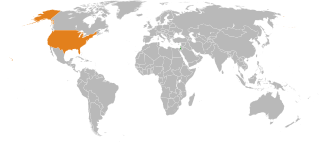
Since the 1960s, the United States has been a strong supporter of Israel. It has played a key role in the promotion of good relations between Israel and its neighbouring Arab states—notably Jordan, Lebanon, Egypt—while holding off hostility from countries such as Syria and Iran. Relations with Israel are an important factor in the U.S. government's overall foreign policy in the Middle East, and the U.S. Congress has placed considerable importance on the maintenance of a supportive relationship.

The State of Israel is represented in the Russian Federation through an embassy in Moscow and a consulate-general in Yekaterinburg. Russia is represented in Israel through an embassy in Tel Aviv and a consulate in Haifa. Russia is a member of the Quartet on the Middle East. For many years, Israel was a haven for Russian Jews. This was especially the case during the aliyah from the Soviet Union in the 1970s and 1990s. Israel and the Soviet Union, Russia's predecessor state, were on opposing sides during the Cold War. However, the relationship between Israel and Russia has improved significantly since the early 2000s, with the election of the more pro-Israel Russian leader Vladimir Putin, and the election of the more pro-Russia Israeli leader Ariel Sharon. Putin has had a close relationship with long-serving Israeli prime minister Benjamin Netanyahu.
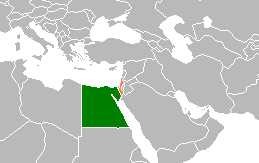
Egypt–Israel relations are foreign relations between Egypt and Israel. The state of war between both countries which dated back to the 1948 Arab–Israeli War culminated in the Yom Kippur War in 1973, and was followed by the 1979 Egypt–Israel peace treaty a year after the Camp David Accords, mediated by U.S. president Jimmy Carter. Full diplomatic relations were established on January 26, 1980, and the formal exchange of ambassadors took place one month later, on February 26, 1980, with Eliyahu Ben-Elissar serving as the first Israeli Ambassador to Egypt, and Saad Mortada as the first Egyptian Ambassador to Israel. Egypt has an embassy in Tel Aviv and a consulate in Eilat. Israel has an embassy in Cairo and a consulate in Alexandria. Their shared border has two official crossings, one at Taba and one at Nitzana. The crossing at Nitzana is for commercial and tourist traffic only. The two countries' borders also meet at the shoreline of the Gulf of Aqaba in the Red Sea.
The Barack Obama administration's involvement in the Middle East was greatly varied between the region's various countries. Some nations, such as Libya and Syria, were the subject of offensive action at the hands of the Obama administration, while nations such as Bahrain and Saudi Arabia received arms deliveries. Notable achievements of the administration include inhibiting the Iranian nuclear program, while his handling of certain situations, such as the Syrian civil war, were highly criticized.

Bilateral relations between Australia and Israel, were established in 1949. Australia has an embassy in Tel Aviv and Israel has an embassy in Canberra.
Events in the year 2009 in Israel.

Direct negotiations between Israel and the Palestinian National Authority took place throughout 2010 as part of the peace process, between United States President Barack Obama, Israeli Prime Minister Benjamin Netanyahu, and Palestinian Authority Chairman Mahmoud Abbas. The ultimate aim of the direct negotiations is reaching an official "final status settlement" to the Israeli–Palestinian conflict by implementing a two-state solution, with Israel remaining a Jewish state, and the establishment of a state for the Palestinian people.
Events in the year 2011 in Israel.
These are some of the notable events relating to politics in 2011.
International reactions to the Egyptian revolution of 2011 refer to external responses to the events that took place in Egypt between 25 January and 10 February 2011, as well as some of the events after the collapse of the government of Egyptian President Hosni Mubarak, such as Mubarak's trial. The reactions have generally been either measured or supportive of the Egyptian people, with most governments and organisations calling for non-violent responses on both sides and peaceful moves towards reform. Whilst the protesters called for Mubarak to step down immediately, most foreign governments stopped short of this demand, at least during the early phases of the protests, due to realpolitik concerns about the consequences of a power vacuum on the stability of Egypt specifically and to the wider Middle East as a whole. Some Middle Eastern leaders expressed support for Mubarak. Meanwhile many governments issued travel advisories and evacuated their citizens from the country.

David Keyes is an Israeli-American public relations representative and human rights activist. Keyes was the executive director of Advancing Human Rights, the co-founder of CyberDissidents.org, and the head of Movements.org, a platform for crowdsourcing human rights. The New York Times called Keyes "a pioneer in online activism."
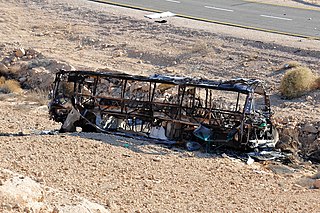
On August 18, 2011, a series of cross-border attacks with parallel attacks and mutual cover was carried out in southern Israel on Highway 12 near the Egyptian border by a squad of presumably twelve militants in four groups. The attacks occurred after Israel's interior security service Shin Bet had warned of an attack by militants in the region and Israeli troops had been stationed in the area. The militants first opened fire at an Egged No. 392 bus as it was traveling on Highway 12 in the Negev near Eilat. Several minutes later, a bomb was detonated next to an Israeli army patrol along Israel's border with Egypt. In a third attack, an anti-tank missile hit a private vehicle, killing four civilians. Eight Israelis – six civilians, one Yamam special unit police sniper and one Golani Brigade soldier—were killed in the multiple-stage attack. The Israel Defense Forces reported eight attackers killed, and Egyptian security forces reported killing another two.
The August 2012 Sinai attack occurred on 5 August 2012, when armed men ambushed an Egyptian military base in the Sinai Peninsula, killing 16 soldiers and stealing two armored cars, which they used to infiltrate into Israel. The attackers broke through the Kerem Shalom border crossing to Israel, where one of the vehicles exploded. They then engaged in a firefight with soldiers of the Israel Defense Forces (IDF), during which six of the attackers were killed. No Israelis were injured.
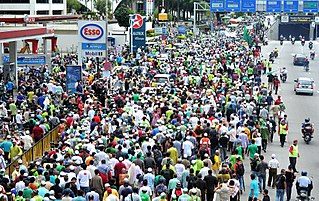
The release of the anti-Islamic short film Innocence of Muslims triggered numerous demonstrations across North Africa, the Middle East and South Asia. On September 11, 2012, dozens of protestors scaled the walls and entered the courtyard of the U.S. embassy in Cairo, Egypt. On September 13, 2012, protests occurred at the U.S. embassy in Sana'a, Yemen, resulting in the deaths of four protesters and injuries to thirty-five protesters and guards. On September 14, the U.S. consulate in Chennai was attacked, resulting in injuries to twenty-five protesters. Protesters in Tunis, Tunisia, climbed the U.S. embassy walls and set trees on fire. At least four people were killed and forty-six injured during protests in Tunis on September 15. Further protests were held at U.S. diplomatic missions and other locations in the days following the initial attacks. Related protests and attacks resulted in numerous deaths and injuries across the Middle East, Africa, Pakistan, and Afghanistan.
Following the 2012 diplomatic missions attacks that began on September 11, 2012, many nations and public officials released statements. Widespread early news coverage said that the protests were a spontaneous response to an online preview of Innocence of Muslims, a movie considered offensive to Muslims. Later consideration of the Libya attack's complexity, of statements made by some Libyan officials, and of the potentially symbolic date fueled speculation of preplanned efforts. U.S. missions in Cairo, Egypt, and Benghazi, Libya, were attacked during the first day of the protest.

On December 6, 2017, the United States of America officially recognized Jerusalem as the capital city of the State of Israel. American president Donald Trump, who signed the presidential proclamation, also ordered the relocation of the American diplomatic mission to Jerusalem from Tel Aviv, constituting what is now the Embassy of the United States in Jerusalem, which was established on the grounds of the former Consulate General of the United States in Jerusalem. Israeli prime minister Benjamin Netanyahu welcomed the decision and praised the announcement by the Trump administration. On December 8, U.S. Secretary of State Rex Tillerson clarified that Trump's statement "did not indicate any final status for Jerusalem" and "was very clear that the final status, including the borders, would be left to the two parties to negotiate and decide" in reference to the recognition's impact on the Israeli–Palestinian peace process.

